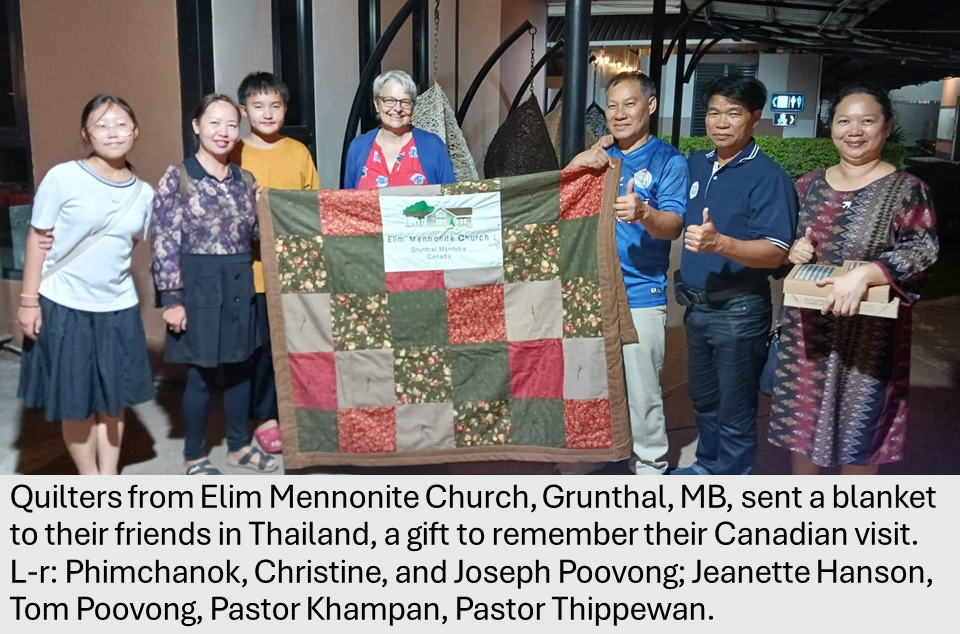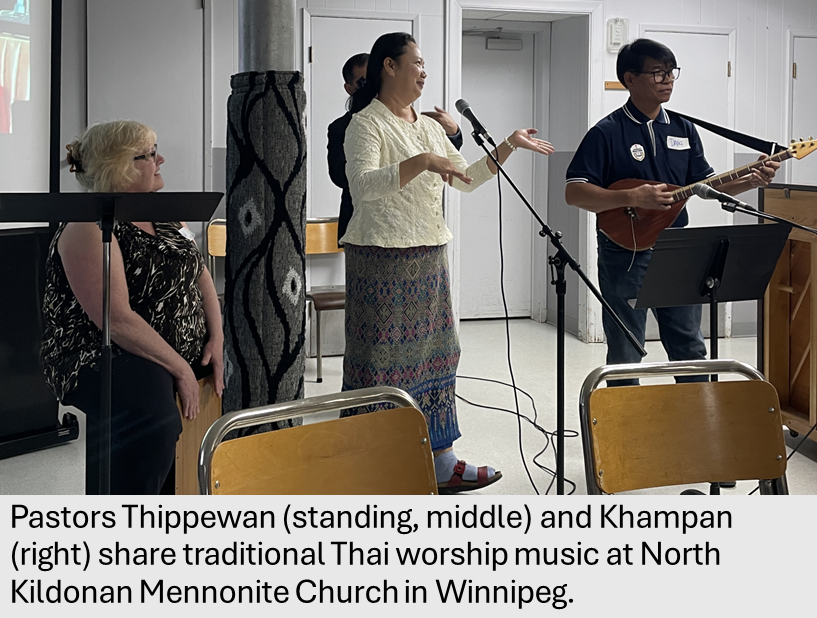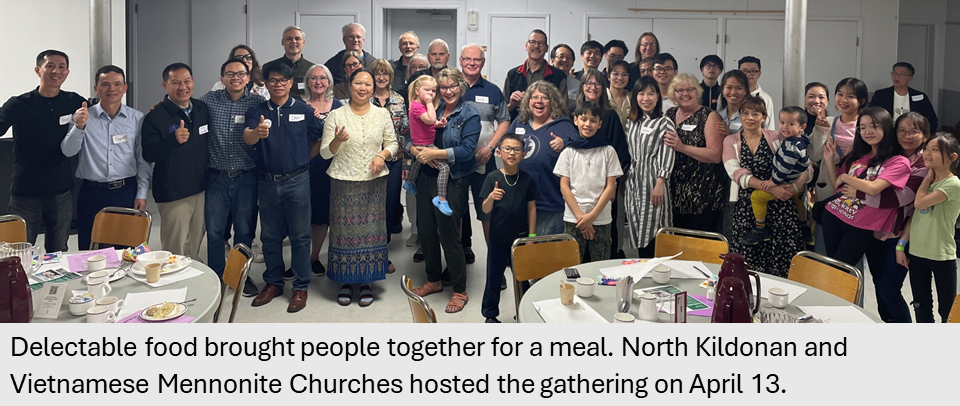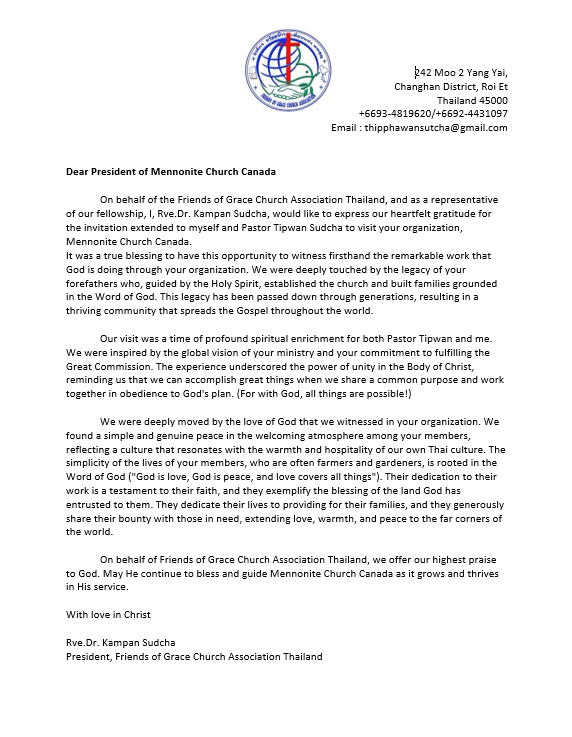July 23rd, 2024Thai pastors describe first time visit to Canada as “Profound”
Winnipeg – “Mostly in Thailand, we look for people. In Canada, we looked for fish,” quipped Pastor Khampan during a Zoom interview from his home base in northeast Thailand.
The fishing trip Khampan and his wife, Pastor Thippewan, enjoyed was a welcome diversion from an otherwise hectic schedule in southern Ontario.
The couple were guests of Grace Lao Mennonite Church in Kitchener during their first ever visit to Canada from April 4 – April 29. Their four-day stay in Ontario included sharing their ministry story and meeting other Laotian Mennonites who were attending a Lao Mennonite Conference.
 Tom Poovong, long term MC Canada Witness worker in northeast Thailand, accompanied Khampan and Thippewan and served as a tireless translator during their trip (and for this interview). The trio visited Mennonites and their congregations in Ontario, Manitoba, Saskatchewan, and Alberta.
Tom Poovong, long term MC Canada Witness worker in northeast Thailand, accompanied Khampan and Thippewan and served as a tireless translator during their trip (and for this interview). The trio visited Mennonites and their congregations in Ontario, Manitoba, Saskatchewan, and Alberta.
They met with ministry supporters, reconnected with Canadian Mennonites who had visited them in Thailand during a Learning Tour in 2022, and exchanged experiences about outreach and church planting in the two different countries and cultures.
Tom Poovong, together with his wife and ministry partner Christine, met Khampan and Thippewan through their church planting work in northeast Thailand. The region has a population of about 25 million people in a country about nineteen times smaller than Canada. In their region, the ministry has become known as Friends of Grace Church (FGC). Khampan serves as president of the group, which has grown to fifty-six churches with established meeting places.
A ministry model that encompasses care for their financial well-being and physical and spiritual health attracts people and to FGC.
The Poovongs have developed multiple income-generation ministries, including MennoShoes and a restaurant that serves cuisine unique to the Isan cultural region where they reside. The income helps support pastors and ministry growth.
The Poovong’s collaboration with Khampan and Thippewan – who have forty years of evangelism experience in the rural region – has helped open doors in villages that share a similar language (Isan dialect) and culture with the bordering country of Laos.
FGC became officially registered with the Thai government in 2019.
Ontario
Yoel Masyawong, pastor of Grace Lao Mennonite Church in Kitchener since 2004, helped host Tom Poovong and Pastors Khampan and Thippewan in southern Ontario.
Originally from Thailand, Masyawong studied theology in a Baptist context in the city of Chiang Mai, before coming to Canada in 1998. He also works part time with intercultural ministries for Mennonite Church Eastern Canada, focusing on helping first-generation immigrant churches adjust to their new context.
Masyawong’s congregation of about fifty wrestles with Canadian and Mennonite cultures. For Christians in southeast Asia, he said, sharing their beliefs is quite simple, and openly received. “Don’t get me wrong. Evangelism is not easy in Thailand. But there are more opportunities,” he said, partly because of the holistic approach the Poovongs offer.
When sharing their faith in Canada, “Lao people who have been living here for forty or forty-five years have adapted to the Canadian tendency for privacy,” Masyawong said. It stems from a long, traditional Mennonite history that leans toward indirect witness through service, giving, and peacemaking, he added.
An ongoing challenge for Masyawong is trying to balance support for global mission versus home ministry among the Lao community. Some say, “We have lots of young adults, the mission should be here [in Canada], and others feel the mission is outside Canada.”
Masyawong hopes the stories of growth in the FGC network shared by Khampan and Thippewan will inspire his congregation for ministry at home and abroad.
In the past two years, the Lao congregations in southern Ontario have partnered to help support the rental costs of a church meeting place in Thailand for Lao migrant workers. A struggling economy exacerbated by the pandemic has forced tens of thousands of Lao people from their homeland.
In Canada, children and youth begin to lose the Lao language once they begin attending school, said Masyawong. “It’s difficult to help them relate to the mission in Thailand.”
A highlight of hosting his guests was to see the caring approach and commitment his congregation and their guests share with each other. “We have similar cultures, so we could relate to them a lot. I feel that many people [in my congregation] developed a deep connection with them. Many [church members] shared contact information with them to keep in touch,” he said.
Jeanette Hanson, director of International Witness, has visited the FGC ministry many times. She observes that the mild year-round climate and homes that often feature courtyards are more open to the street.
“Courtyard living makes a huge difference for evangelism. Enormous. People aren’t resistant to hearing about your faith, so in some ways it’s simple, having people wander by and sit down to share some tea. But it’s also complicated. In many ways, you live in a glass house,” said Hanson.
Manitoba
Doris Wiens and Gerald and Evelyn Guenther hosted Tom Poovong and Pastors Khampan and Thippewan in part to reciprocate the hospitality they experienced during their visit to Thailand in 2022.
Wiens was concerned Canadian-style hospitality wouldn’t measure up to their outstanding experience in Thailand, where “they sang praise songs in English, and Tom translated everything for us,” said Wiens.
 Thippewan led the congregation in some traditional dance movements – not something the Elim congregation was used to. “It felt like we were back in Thailand for a few minutes there,” said Evelyn. “I think our [worship] service seemed pretty dry to them,” added Gerald.
Thippewan led the congregation in some traditional dance movements – not something the Elim congregation was used to. “It felt like we were back in Thailand for a few minutes there,” said Evelyn. “I think our [worship] service seemed pretty dry to them,” added Gerald.
Khampan and Thippewan shared their faith stories with the Elim congregation. Their testimonies helped the congregation connect the work with what their donations accomplish in Thailand.
“Piecing those things together was helpful,” said Wiens.
A big part of community building for the church in Thailand is sharing a meal after every service, compared to occasional potlucks for the Elim congregation.
Elim hosts learned that in Thailand, as soon as anyone expresses interest in leadership, “Tom is already thinking about getting a business plan going. You need a side business so you can survive,” said Wiens.
For Wiens and the Guenthers, a highlight of hosting the trio was the exuberance they showed for spreading God’s love, and the tremendous collaborative energy they share. “You could see they really made an effort to work together,” said Wiens.
Gerald observed how the FGC ministry stresses the need for women in church leadership. About half of FGC’s monthly Bible teaching sessions are women, said Jeanette Hanson, director of International Witness for MC Canada. She observes that while Buddhism is not a state religion, its dominance connects people economically and culturally – especially men. “The society is very male dominated, so women can be more courageous and have less to lose if they step outside of the expectation of being Buddhist,” she said.
Whether the students are men or women, they leave their jobs and homes to come from far and wide to train. “They make quite a commitment to learn more,” said Gerald. “To me, that was so impressive. They are so eager to hear God’s word and also spread God’s word.”
In a follow-up email, Khampan noted that FGC teaches biblical examples of women in leadership. In Thailand, “Women care about the church and the home.” FGC strives “to have women leaders not only in the home, but also in the church. We see good management skills and we see women in the Bible are used by God in many ways.”
FGC ordains women as well as men. “They can be part of a team that works together.” Moreover, “… any gender or age can be ordained and encouraged to become leaders,” he said.
During her Learning Tour visit, Evelyn observed how other travelers often commented on their sense of safety in Thailand. Gerald said, “The traffic there is just crazy,” yet it was rare to hear a horn honking.
That’s a Buddhist thing, said Doris. “You can’t get mad. That was amazing to me.”
Hanson notes that Buddhist peace teachings offer common ground and an open door for the FGC ministry.
Khampan has joined a Muslim and a Buddhist leader as provincial representatives for interreligious dialogue in their region. “They are very much wanting to have more dialogue, especially with Buddhist leaders,” said Hanson. “[Pastor Khampan] has worked with a lot of communities to build bridges.”
With peace being an important pillar of Buddhist faith, “Most people assume that a deeply religious person will be a person of peace. To emphasize that aspect of Christianity is very attractive, because they don’t, and even some Christians there, don’t see Christianity as a peaceful faith in the world.”
The Elim hosts gifted their guests with a Jets hockey souvenir pack, which included a hockey puck. Laughter and fun erupted when Khampan and Thippewan attempted stick-handling a puck on a portable, synthetic ice pad. Later, they watched a Jets game on TV.
“When they left, they went out to a big pile of snow that hadn’t melted yet and picked up handfuls,” said Evelyn. “They’d never seen snow before.”
Saskatchewan
Sharon Schultz, pastor at Eyebrow Mennonite Church, and recently appointed moderator of Mennonite Church Saskatchewan, was part of the host team for Pastors Khampan and Thippewan as they traveled in the “Land of the Living Skies,” which is Saskatchewan’s license plate motto.
Eyebrow is a small and somewhat isolated rural community of about 125 people, about ninety minutes’ drive northeast of Regina. Schultz said it's hard to feel connected with the wider church, whether that is MC Sask or MC Canada.
On a tour around the hamlet of Eyebrow on a Sunday afternoon, Schultz and her guests happened upon a local resident and his son. They were refining and repackaging bulk honey in their garage. After introductions, Tom exclaimed, “We have honey too!”
A dialogue about honey ensued, with Tom translating for Khampan and Thippewan, and each conversation partner learning from the other.
As pastor of one of the Poovongs supporting congregations, Schultz felt thrilled to see Tom in his element, engaging strangers on the streets of Eyebrow, just as he does in rural Thailand. And likely taking home ideas for producing or retailing honey.
“Tom’s exuberance is inspiring, but not coercive,” said Schultz. She feels that with Tom and Christine being native to the Isan-speaking region of Thailand and having lived in Canada in the past is a good thing (the couple resided in Calgary prior to starting their term with International Witness).
“They have succeeded in having a foot in each country,” said Schultz.
“For us to get connected with the Poovongs has been really important because it gives us a window into what God is doing through people in another part of the world, and people who are different from us,” she added. “People in my congregation really connected with [our guests]. Almost everyone came out to the campfire and were glad to be there. It really felt like we got to know them.”
Schultz observes that in traditional Mennonite circles “… we often seem apologetic about our faith in Jesus, we fear we might be imposing our faith on others. Tom and Pastors Khampan and Thippewan live their lives unashamedly for Jesus. They aren’t coercive, it’s just who they are, and it’s attractive, and they are seeing people respond.
“The more I get connected with the wider church, the more blessed I am. I need those connections,” said Schultz.
Alberta
Erinne Wolfe of Trinity Mennonite Church just south of Calgary served as coordinator for Pastor’s Thippewan and Khampan in Alberta. Trinity is the home congregation of the Poovongs when they lived in Canada and is also their sending church for the ministry in Thailand.
Wolfe appreciated the joy and enthusiasm of her guests at the dessert night organized by her church. The small size of her congregation did not dampen the enthusiasm of their guests as they shared cultural praise music and taught attendees dance steps they typically use to celebrate God’s presence at their worship services in Thailand.
“To them it didn’t matter how big a group was worshipping, they could celebrate and worship with joy. That’s an attitude that we, as a small church, definitely share,” said Wolfe.
The photos of FGC Bible teaching classes in Thailand that Tom shared with the group resonated with Wolfe. “Sometimes there would be a group of four of them, and the next time a group of twenty. In all of the pictures, you could see that everyone was having a wonderful time together learning and worshipping,” said Wolfe.
Wolfe, a school teacher, learned that in Thailand, Thippewan and Khampan frequently travel up to six hours through challenging terrain to meet with FGC groups in isolated villages. “They go well out of their way to show God’s love to other people. A lot of people at [my] church find the work they do [in Thailand] very inspiring,” said Wolfe.
The gathering was a bit of a homecoming for Tom. Having lived in Alberta before moving to Thailand for their ministry meant leaving behind family and friends in Canada. Many came out for the evening to show their support. “Tom was in tears a little bit,” said Wolfe.
Dolores Peters of Bergthal Mennonite Church in Didsbury, Alta., was inspired by the stories Khampan and Thippewan shared. “It’s just really incredible to hear the stories of someone who is in the right place to use all the gifts that God has given them,” she said.
Peters and her husband Phil McKinnon, lived in China for eleven years prior to the Poovongs starting their ministry in Thailand. She has visited some parts of Thailand, and noticed “How the contrast between the poor and the wealthy is quite dramatic.”
She especially loved hearing about the collaborative pilot project between FGC, MC Canada, and Anabaptist Mennonite Biblical Seminary to provide theological training to current and future church leaders on the ground in Thailand.
“For a poor congregation, you simply can’t afford to send a student to the states, and they can’t afford to give up two years of income,” said Peters.
Peters said her church has a history of hosting speakers from all over the world, and participating in Learning Tours. “The relationship that we are building with the Thai church is an exchange and allows us to learn from each other.”

Guests’ perspective
Pastors Khampan and Thippewan expressed both surprise and gratitude for their visit to Canada. Surprise at the size of Canada’s geography, and gratitude for the generous welcome they received from their hosts everywhere they went. In a follow-up letter thanking their Canadian hosts, they wrote, “Our visit was a time of profound spiritual enrichment.”
Before arriving in Canada, they pictured large Mennonite congregations, and while they saw some big churches, many they visited were small and unique. “We could feel their warmth,” said Thippewan.
The pair visited numerous Mennonite churches, schools, MCC Thrift Stores, and administrative offices. They marvelled at the large number of Thrift Stores.
Khampan was struck by the highly organized structures Mennonites in Canada enjoy, which spans Mennonite schools and camps that start children from a young age, right through to care of seniors in Mennonite care homes. “Your structure is already in place for many years and is really good, while in Thailand we are still in the pioneering stage. Seeing how Mennonites are organized in Canada is helpful for us in Thailand.
“Your older people are very happy,” he observed about a visit to a care home in Rosthern, Sask.
At Wanuskewin, an Indigenous museum on the outskirts of Saskatoon, the visiting pastors learned about the Doctrine of Discovery and land claims. Thailand has never been colonized, said Khampan. As an Indigenous Thai person, he deeply identified with the Indigenous concept of land ownership.
In a follow-up email, Khampan said that Thai citizens have the right to own land, and to pass it along to children and grandchildren. Along with the right to land ownership comes the responsibility of paying taxes and looking after the land.
“When the land belongs to Christians, the Bible teaches us to share together so that it will become a place for us together. We need to share with those who have no land so that they will not be left out.”
The pastor pair particularly felt blessed by the turn out of pastors that heard them share in Calgary about their ministry. “Many pastors showed up that day. It was a very exciting,” said Khampan.
A visit to Mennonite Archives at Conrad Grebel University College (CGUC) impressed the pair with the long story of Mennonite heritage, and how congregations share “… a passion to pass on their faith to the next generation,” said Khampan. They were thrilled to once again see their friend and CGUC faculty member Dr. Derek Suderman, who has taught theology to classes of leaders in the FGC network in Thailand on two occasions.
To address the challenge of Christian leadership, Khampan, Thippewan, and the Poovongs organize four days of classes that take place during the first week of every month. The forty participants represent forty small congregations from round the region. Recently, three friends of Khampan that are currently outside the FGC network have joined the classes, representing an additional three congregations.
Looking forward, Khampan said that the pioneering work of church planting started by the Poovongs now needs to focus on building up and strengthening relationships within the Friends of Grace Network.
“Our vision for FGC is to make new believers, new leaders, and new churches,” said Tom Poovong, who has served three terms in Thailand.
Both guest pastors observed that the intercultural church in Canada seems to enjoy the gift of unity, while traditional Mennonites especially enjoyed sharing their various versions of farmer sausage.
Khampan quipped that Mennonites in Canada “… share one faith, one love, and one farmer sausage!” The guest pastors loved it, and purchased a large box of frozen sausage from CommonWord in Winnipeg. They managed to keep it frozen for the remainder of their trip across Canada and then home to Thailand, where they served it to the class at their monthly Bible training session.
A takeaway for Hanson is the commitment that Pastors Thippewan, Khampan, and the Poovongs have for their work, and the joy they get from it. The FGC churches with meeting places are part of a bigger picture: there are more than one hundred worshipping groups in total, many of which meet in homes, restaurants, and storefronts.
“These are incredibly hard-working people,” said Hanson of the FGC team. “They work 24/7.” Hanson has expressed her concern for their long hours.
“When I speak with them about taking time off for self-care, they say ‘But we’re having so much fun, and we’re working with people we think of as family.’”
-30-
Hear Tom Poovong’s faith story as recorded at Elim Mennonite Church on April 14, 2024.
Below: Pastors Khampan and Thippewan’s letter thanking their Canadian hosts for the “time of profound spiritual enrichment” they enjoyed during their visit to Canada. - screen capture
